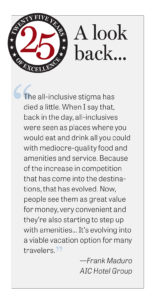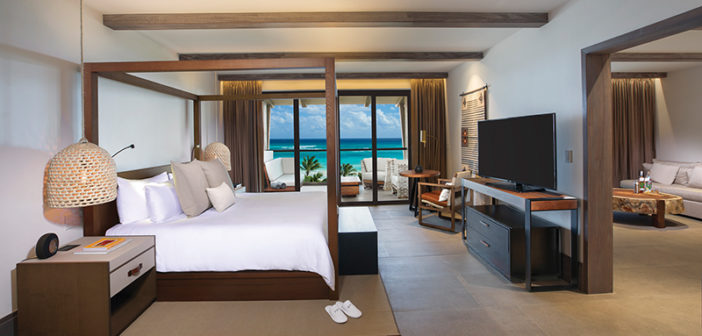MIAMI—Last year, the All Inclusive Collection changed its name to AIC Hotel Group—an indication of the brand’s commitment to expanding its current portfolio to include European-plan (EP) hotels. But while EP hotels—properties in which F&B isn’t included in the price—is a focus for the company, that doesn’t mean it’s lost its attention on all-inclusive properties. Indeed, the company recently opened UNICO 20 87, the first in a new brand the company is eyeing to expand.
The UNICO Hotels brand is committed to local culture and immersion. (In fact, the first hotel takes its name from the latitude and longitude where the property is located in Riviera Maya on Mexico’s Yucatan Peninsula.) Frank Maduro, VP of marketing for the company, noted that the reason for the new brand was simple: It’s what the guests wanted. “We’ve been running all-inclusives for 30 years and we’ve progressed and introduced new brands, really listening to our clients and the new generation of travelers,” he said. “We realized they want something very experiential, aspirational, more about immersing themselves with the local culture vs. just going to the beach, sun and sand.”
Certainly, all-inclusive guests still want the sun and the sand. But the old stereotype—a vacation full of all-you-can-eat food and drink while relaxing by the beach—has given way to a more immersive experience. “That’s how we came up with this hotel: really listening to guests, our loyalty members,” he said.
AIC Hotel Group, which is exclusively contracted by RCD Hotels to spearhead the sales and marketing efforts for luxury resort properties, took two years to develop the brand, interviewing travel agents, loyalty members, clients and hotel staff to really get it right. “We came up with a concept based on that feedback and the experiences people were asking and looking for, and what we saw as far as trends in travel,” he said.
The result is a 448-key property that embraces the locale, from food and beverage to spa treatments to curated adventures. “We are looking at an experience that’s not scheduled, with a lot of unexpected pop-up events driven by local offerings,” Maduro said. “We’re curating tours very specific to that hotel. One example is a Mayan village, and in that village there are freshwater pools, crystal clear, that are naturally built in the ground. People get to swim in these pools, and they’re very private experiences. At the end of the tour, the people from the Mayan village cook a meal for our guests. It’s an immersive experience. It’s not a typical water park experience with 10,000 other people. We’re talking about 15-20 person groups. They’re intimate and quaint, and they all have someone who guides them through the experience and explains the fauna and the birds that can be found. It’s very personalized and immersive.”
Similarly, the hotel brings in local artists—performers, musicians, painters and sculptors. “As an example, every room gets Mexican straw hats and they can bring down these hats to one of these craftsmen, and the craftsmen can actually personalize it for them—hand-paint it or with specific graphics on the spot. We want to introduce people to what Mexico has to offer through local culture. It’s not so much a prepared experience vs. an unexpected type of experience,” he explained.
With exteriors designed by Artigas and interiors conceptualized by AvroKo, the focus on local is apparent in the aesthetic as well. “We wanted to capture traditional Mexico, but modernize it, make it more international. You’re not going to find a typical Mexican hacienda. You’re going to find what a homeowner nowadays in Mexico would build on the beach. It’s a very modern take on traditional Mexico,” Maduro said.
“We source a lot of the furniture, a lot of the decor, a lot of the materials we built the hotel with locally from Mexico,” he continued. “All the artisans that are supplying the materials are local. We struck up deals with local art galleries. We infused a lot of money into the local economy and will continue to purchase locally because that’s what people want to experience.”
 As for the future, he said, “We’re seeing tremendous acceptance by our travelers and travel partners with this brand. We’re doing phenomenally well since we opened. We are looking to expand the brand to other parts of the Caribbean. I can’t tell you where yet because we’re still negotiating, but we’re definitely going to expand the brand in at least two more destinations.
As for the future, he said, “We’re seeing tremendous acceptance by our travelers and travel partners with this brand. We’re doing phenomenally well since we opened. We are looking to expand the brand to other parts of the Caribbean. I can’t tell you where yet because we’re still negotiating, but we’re definitely going to expand the brand in at least two more destinations.
“We’re seeing the acceptance of the all-inclusive products becoming more popular, so we’re definitely going to expand in more destinations that can really absorb all-inclusives,” he continued. “All-inclusives can’t be operated in every single destination. We’re also looking for more presence and city hotels in major U.S. cities, and more business-style hotels. The trend right now from an investment perspective is the safety of hotel real estate, especially on the business travel side, and then on the leisure side, our sweet spot is the all-inclusive market and branding with the right partner. People are still looking for that brand comfort and we’ve been able to provide that with Hard Rock, so we’re looking for other expansions with the Hard Rock brand.”
Currently, the company is working on two properties in Cabo San Lucas—a 600-room Hard Rock all-inclusive hotel and a 200-room Nobu EP hotel. “We’re also working on a property in Riviera Cancun, an 1,800-room Hard Rock Hotel. Plus, we have one we signed and are working on but haven’t officially announced yet, but it’ll be on another island, another big hotel,” he said. HB


